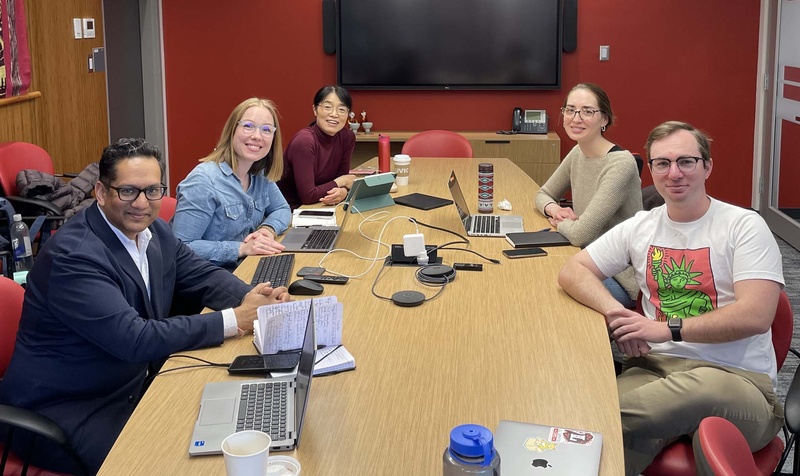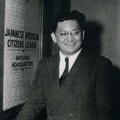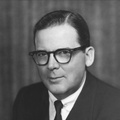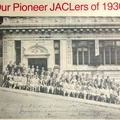In the world of academia, rarely does one encounter international research centers dedicated to researching a historical event. Yet that is the case with the University of Victoria’s Past Wrongs, Future Choices Initiative.
The Past Wrongs, Future Choices (PWFC) is an initiative based at the University of Victoria that documents the global history of Nikkei incarceration during the Second World War. Led by Jordan Stanger-Ross of the University of Victoria and Audrey Kobayashi of Queen’s University, the PWFC initiative connects scholars and institutions from around the world to form a research network invested in studying the history of Nikkei incarceration.
As part of developing an international research network, the University of Victoria hosts scholars and artists at the university to foster a collaborative environment that culminates in a speaker’s series hosted by the Center for Global Studies and Center of Asia Pacific Initiatives. During Spring 2023, the University of Victoria hosted its first in a series. cohort of scholars and artists in residence. Among the first cohort included historians Masumi Izumi, Neilesh Bose, and Jonathan van Harmelen; anthropologist Andrea Mariko Grant; and artist Elysha Rei. At the end of our residence, I decided to organize an interview with my fellow scholars and artists to help explain the importance of PFWC and its unique nature among academic projects.
Below is my interview with the scholars and artists working with PWFC from March 22, 2023. A previous version of this interview appeared in the May 2023 issue of the JCCA Bulletin.
* * * * *
Jonathan van Harmelen: This is the March 22, 2023 interview with the Past Wrongs, Future Choices scholars and artists in residence. I am Jonathan van Harmelen, one of the scholars in residence here at the University of Victoria. We have with us Andrea Mariko Grant, a scholar in residence and postdoc; Masumi Izumi, scholar in residence from Doshisha University; Neilesh Bose, scholar in residence from University of Victoria, and Elysha Rei, artist in residence from Nikkei Australia.
Today, I want to start by asking everyone here: How has your time working at UVic benefited your work? What have you enjoyed about being a fellow, and how has it helped with your research, kind of just general reflections. So that’s where I want to start.
Elysha Rei: I’ve certainly enjoyed it. Being part of the collegiality and even just the informal conversations that happen and the breadth of experiences from different parts of the world and learning a lot about things that perhaps you can’t even read in journal articles. Then, there’s personal anecdotes and stories that have been shared.
Masumi Izumi: I am a historian. When we go somewhere for research, historians are expected to go into the archives and collect materials and manuscripts. And I feel a little bit bad that I haven’t been doing that so much. On the other hand, I’m spending a lot of time socializing with my fellow scholars and artists in residence for the PWFC project this time, and I have been learning so much more from it. I still love doing archival research, but these days, we can collect a lot of materials without actually going to the archives.
Sharing knowledge, thoughts, and inspirations with other PWFC participants has given me different ideas. It has given me ideas about what I need to collect and how to put the information together for the output.
In my past research trips, I already knew what kind of information I wanted beforehand, and I would visit the archive to photocopy or something. That’s how I usually worked in the past.
Being here, I engaged myself in a more generative kind of activity that got me to think critically about the research I was doing. So yeah, it has been really different from the past research trips that I did, and it has been wonderful.
Andrea Mariko Grant: Without being here, I don’t think I would have been able to have the same kind of collaborations and relationships with people. For example, without being here physically, I don’t think Masumi and I would have ever worked together on a collaborative paper and presentation.
I’m writing about my grandmother’s poetry, Etsuko Tsuji, and I don’t think I necessarily would have ever thought on my own to compare it with Hatsuye Egami’s work. Or in other examples, Elysha and I have been able to interview Japanese Canadian artists together. And the previous artist in residence, Rachel Iwaasa, and I are working on a creative project together.
So I think that foundation of being together, sharing the same spaces and having impromptu conversations, helped to generate really productive and wonderful collaborations.
Neilesh Bose: I think just to add to what everyone’s saying, I have found the magic about being together inspiring to think about points of convergence across different fields of history. I work on the history of South Asia and the history of South Asian diasporas in a global context; so I’m very interested in questions of race and citizenship as they inform histories across the twentieth century.
And this is the kind of space that I think is almost unprecedented to have people who work in different parts of this history come together. It is not only useful in terms of sharing ideas about new sources, as I think most historians are fixated on the actual sources. But this has allowed me to think broadly about various kinds of methods and sources.
And so the discussions and engagements with art are really valuable, because they just help us think in different ways. And I don’t think that would have been possible without this collective. I could certainly have read about all of this and I could certainly have viewed art on my own, but I don’t think our final product would be the same, as the kind of thinking one can do together is much more than the sum of the parts. And I value also very much the in person, face to face, sometimes impromptu nature of these discussions which produce unpredictable sources of magic and insight.
Jonathan van Harmelen: I think this is great. To echo everyone, what I’ve really appreciated about being here and meeting everyone, residents and other people in the Victoria community. Since COVID is winding down, it has been great to meet each other and work together as collaborators.
As you were mentioning, Masumi, academic work is often you working by yourself, such as going through the documents and writing a manuscript. Collaboration is as much about being together and being able to bounce ideas off one another as it is contributing to a project. Working in a collaborative environment really has been kind of an enriching experience, and I think this experience has been beneficial for all of us.
And, of course, to have people across different disciplines, either within history, such as with you Neilesh and your work in South Asian Studies. And then Elysha, as an artist, it’s amazing how you integrate archival material in this unique way. It really shows how you can present history beyond just writing a book or an article. I think moving forward, it has inspired me to look at my work in novel ways.
Masumi Izumi: Listening to Elysha’s talk the other day, I learned how you can see or how you can read through your hands. Because I’m a very brainy person, I always thought that art was not really a thing although I enjoy art. It’s like, I would see art and I would think, “Yeah, it’s pretty.”
But I learned that that’s not what art is about. Elysha showed how she saw the details in the camp photos that she didn’t see before she cut those photos. She showed us how we can see different things. And that really struck me because it was so new to me. This only happened, because artists and scholars came together in this project.
Elysha Rei: Well, to expand on that, Masumi, I think that the connections between scholarly history, art, and even with Jeannie Shinozuka, her work in biology, and so forth, I’ve been really surprised by the synergies between people’s work and methodologies and research. And I’m quite excited about that. I feel like it’s only the beginning – that there’s so many ideas and connections and research that’s just going to continue from this. And I’m so happy to be here at the very beginning of the project for that reason. Because there’s still so much work to do in that space.
Masumi Izumi: If I can just add one more thing, in the series of presentations we did, we were sharing the space. We were in the same room. So yesterday, it also struck me when Andrea read her grandmother’s poems that we could imagine the same scene, and we almost heard the same sound.
And we could sense the same vibration and even silence. Because we were physically in the same room, we were feeling the same thing. Maybe even if we didn’t see the same thing, we could hear the sound and understand the loneliness expressed in the poems, for example. You have to share the same air to be able to feel the same vibration.
Elysha Rei: I totally agree with Gabriel’s film that we just watched, this emotional connection to that as well. And like referencing Dion Million’s work, it’s not about history being intellectualized, but it’s also being felt. And I think that just makes the process even deeper than just reading something.
© 2023 Jonathan van Harmelen






